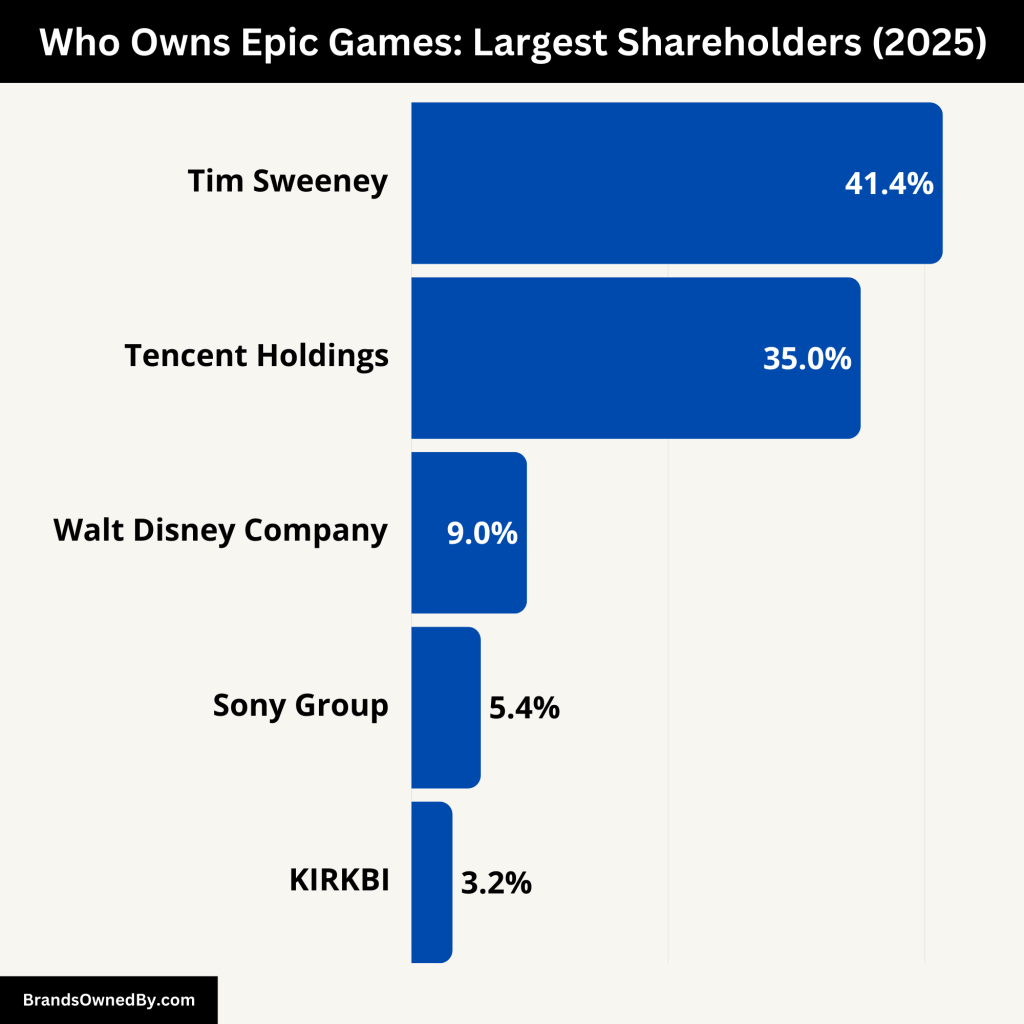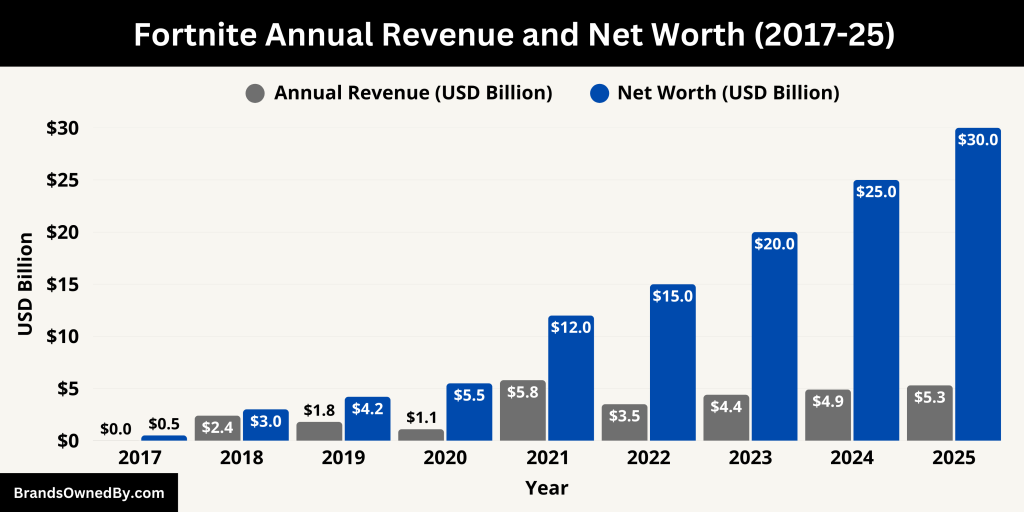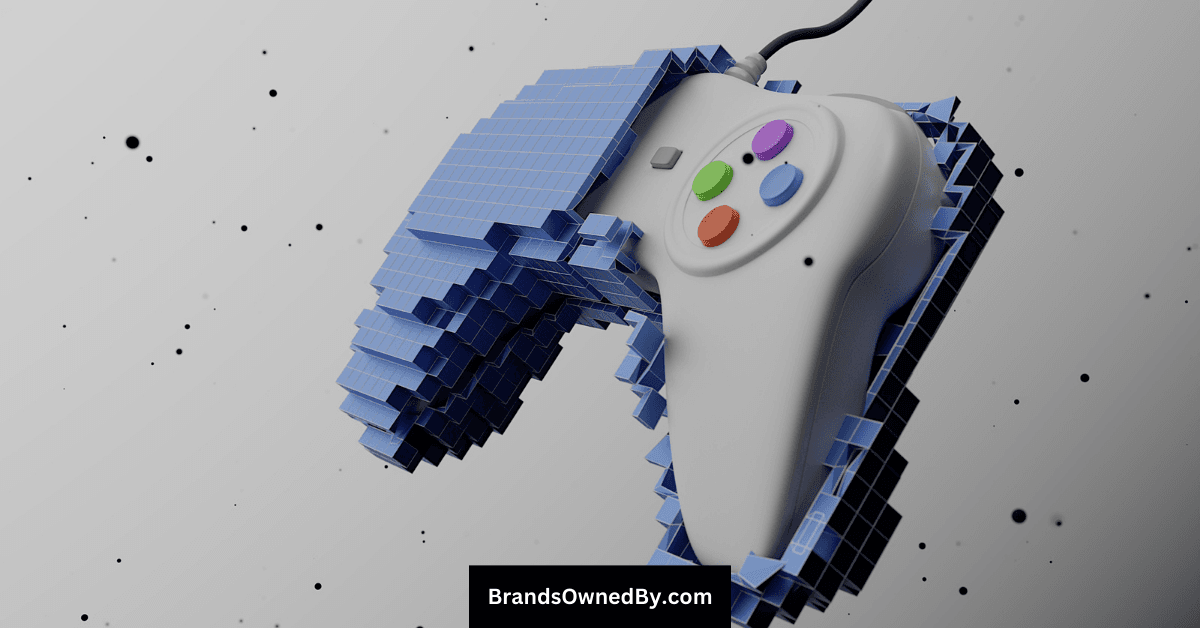Fortnite is one of the most popular games in the world, known for its dynamic gameplay and cultural impact. But many fans and industry watchers still ask, who owns Fortnite?
This article explores the complete ownership structure, revenue, leadership, and companies tied to Fortnite.
History of Fortnite
Fortnite was developed by Epic Games. It was first announced in 2011 as a cooperative survival game. The game underwent several changes over the years. In 2017, it was released with three different modes—Save the World, Battle Royale, and Creative.
The Battle Royale mode became a global phenomenon. Its success pushed Fortnite into mainstream culture. The game attracted millions of players and became a leader in the free-to-play model, using in-game purchases for revenue. Since its launch, Fortnite has regularly evolved with updates, new seasons, and collaborations.
Who Owns Fortnite?
Fortnite is owned and developed by Epic Games, a private American video game and software company. It is not an independent company or a standalone brand with its own corporate structure. Everything related to Fortnite — including development, monetization, marketing, and updates — is controlled by Epic Games.
Epic Games itself is privately held, which means it is not traded on any public stock exchange. Its shares are distributed among the founder, key executives, and institutional investors. Despite external investments, Tim Sweeney, the company’s founder, retains majority control.
While Tencent, Sony, and others have invested in Epic Games, they do not own Fortnite directly. Instead, they own shares in Epic Games, the company that owns Fortnite.
Here’s a quick summary of who owns Fortnite:
- Fortnite is owned by Epic Games, which is privately held.
- Tim Sweeney owns over 50% of Epic and retains decision-making authority.
- Tencent owns 41%, but acts only as a strategic investor.
- Sony and KIRKBI hold smaller stakes, focused on technology and metaverse development.
- Major legal and strategic decisions involving Fortnite are controlled internally by Epic’s leadership.
Parent Company of Fortnite
The parent company of Fortnite is Epic Games, based in Cary, North Carolina, USA. Epic Games was founded in 1991 by Tim Sweeney under the name Potomac Computer Systems, later renamed.
Epic Games is best known for three things:
- Creating Fortnite
- Developing the Unreal Engine
- Operating the Epic Games Store
Fortnite is the company’s most successful game to date and has become a cultural icon since its Battle Royale mode launched in 2017.
Major Shareholders of Epic Games

Even though Fortnite is a product of Epic Games, understanding the ownership of Fortnite requires examining the ownership of Epic Games itself. Here are the key stakeholders:
Tim Sweeney
As founder and CEO, Tim Sweeney still owns the majority of Epic Games. This gives him controlling power over company strategy and product direction, including Fortnite.
Tencent
In 2012, Tencent acquired a 40% stake in Epic Games for approximately $330 million. This made Tencent the largest outside shareholder. However, Tencent is a passive investor. It does not influence day-to-day operations or creative control.
Sony
Sony invested $250 million in July 2020, and later added $200 million in April 2021, bringing its total stake to 4.9%. Sony’s interest focused on strengthening technical partnerships, especially around Unreal Engine and virtual experiences.
KIRKBI
KIRKBI, the investment company behind LEGO, invested $1 billion in April 2022. This gave it a 3% stake in Epic Games, aimed at building digital worlds and metaverse experiences for children.
Control and Decision-Making
Despite large stakes held by Tencent and others, Tim Sweeney retains full control over Epic Games. He oversees product development, policy, and business strategy. This includes creative decisions about Fortnite’s gameplay, monetization, partnerships, and platform availability.
Epic Games also operates independently from its investors. Tencent does not interfere in Epic’s operational decisions, according to multiple public statements by Sweeney. This ensures that Fortnite’s vision remains aligned with the developer’s original goals.
Legal and Strategic Ownership Considerations
Fortnite’s ownership is also shaped by platform deals, exclusivity contracts, and lawsuits. Notably:
- Epic removed Fortnite from the Apple App Store and Google Play in 2020 due to disputes over in-app purchases and commissions.
- This led to a high-profile lawsuit: Epic Games v. Apple.
- Despite being a private company, Epic’s legal strategy and investor backing reveal how Fortnite’s success also gives Epic leverage in shaping digital commerce norms.
Who is the CEO of Fortnite?
Tim Sweeney is the CEO of Epic Games, the company behind Fortnite. As of 2025, he continues to lead Epic Games, maintaining his role since founding the company in 1991. Sweeney’s leadership has been instrumental in shaping Fortnite into a global phenomenon and steering Epic Games through significant industry challenges.
Background and Vision
Tim Sweeney, born in 1970, is an American video game programmer and businessman. He founded Epic Games, originally named Potomac Computer Systems, in his parents’ house in Potomac, Maryland. Sweeney is also the creator of Unreal Engine, a widely used game development platform.
His vision extends beyond gaming; he envisions a metaverse—an open, interconnected virtual world where users can interact across various platforms. Sweeney’s commitment to this vision has driven Epic Games’ initiatives, including partnerships with companies like Disney and LEGO to build immersive digital experiences.
Leadership Style and Company Direction
Under Sweeney’s leadership, Epic Games has prioritized innovation and creator empowerment. He has been a vocal advocate for fair digital marketplaces, challenging the dominance of tech giants like Apple and Google. Sweeney’s hands-on approach and willingness to confront industry norms have positioned Epic Games as a leader in advocating for developers’ rights and fostering an open digital ecosystem.
Recent Developments and Financial Health
In recent years, Epic Games faced financial challenges, leading to significant layoffs and strategic divestitures in 2023. However, by late 2024, Sweeney announced that the company had become “financially sound,” with Fortnite reaching 110 million monthly active users. This turnaround demonstrated Sweeney’s ability to navigate the company through turbulent times and reaffirmed his commitment to long-term growth and innovation.
Recognition and Personal Endeavors
Sweeney’s contributions to the gaming industry have earned him numerous accolades, including induction into the AIAS Hall of Fame and the Game Developers Choice Lifetime Achievement Award. Beyond his professional achievements, Sweeney is known for his environmental conservation efforts, having donated thousands of acres of forestland in North Carolina for preservation.
Annual Revenue and Net Worth of Fortnite

As of 2025, Fortnite continues to be a major revenue driver for its parent company, Epic Games.
In 2025, Fortnite generated an estimated $5.3 billion in annual revenue. This substantial income is primarily driven by in-game purchases, including cosmetic items, battle passes, and collaborations with major brands and franchises. The game’s free-to-play model, combined with its engaging content and regular updates, continues to attract a vast player base willing to invest in the gaming experience.
Fortnite’s estimated net worth in 2025 stands at approximately $30 billion. This valuation reflects the game’s immense popularity, extensive user base, and the significant revenue it has generated since its launch. The net worth encompasses various revenue streams, including in-game purchases, merchandise sales, and licensing deals, highlighting Fortnite’s position as a cultural and financial powerhouse in the gaming sector.
Below is a detailed breakdown of the historical revenue and net worth of Fortnite:
| Year | Estimated Annual Revenue | Estimated Net Worth |
|---|---|---|
| 2017 | ~$100 million | ~$500 million |
| 2018 | ~$2.4 billion | ~$3.0 billion |
| 2019 | ~$1.8 billion | ~$4.2 billion |
| 2020 | ~$1.1 billion | ~$5.5 billion |
| 2021 | ~$5.8 billion (peak) | ~$12.0 billion |
| 2022 | ~$3.5 billion | ~$15.0 billion |
| 2023 | ~$4.4 billion | ~$20.0 billion |
| 2024 | ~$4.9 billion | ~$25.0 billion |
| 2025 | ~$5.3 billion | ~$30.0 billion |
Brands Owned by Fortnite
As of 2025, Fortnite is not a company itself but a brand and product owned by Epic Games. However, within the Fortnite universe, several in-game brands, game modes, and digital experiences have developed into their own distinct identities.
Below are the major brands and in-game franchises “owned” or controlled by Fortnite as of 2025:
| Brand/Sub-Franchise | Launch Year | Description | Key Features | Audience |
|---|---|---|---|---|
| Fortnite Battle Royale | 2017 | Core free-to-play mode with seasons and narrative arcs | Solo, duo, squad gameplay, frequent content updates, brand collaborations | All ages, competitive and casual gamers |
| Fortnite Creative | 2018 | Sandbox building and game-making mode | Player-made maps, game logic tools, monetization for creators | Builders, developers, casual players |
| LEGO Fortnite | 2023 | Survival crafting game co-developed with LEGO Group | Base building, farming, exploration, family-friendly | Kids, LEGO fans, casual gamers |
| Rocket Racing | 2023 | Arcade-style racing game within Fortnite | Developed by Psyonix, speed-focused maps, multiplayer competition | Racing fans, Rocket League players |
| Fortnite Festival | 2023 | Rhythm-based music game mode by Harmonix | Play instruments, band mode, real music tracks, music pass system | Music lovers, party and rhythm gamers |
| Fortnite OG | 2023 | Nostalgia-based mode that reintroduces older maps and gameplay | Rotating classic seasons and maps, limited-time content | Long-time fans, returning players |
| Collaboration Hub | 2018+ | Branded content integrations from major franchises | Marvel, DC, Star Wars, anime IPs, music artists, live events | Pop culture fans, collectors |
Fortnite Battle Royale
This is the core game mode that launched Fortnite into mainstream success in late 2017. It is a free-to-play, last-player-standing shooter with ongoing seasonal content and major live events.
- It features rotating collaborations with global brands like Marvel, DC, Star Wars, Nike, and more.
- The Battle Royale mode includes its own sub-brands, like “Chapter 4” and “Chapter 5,” which define major content eras with new maps, stories, and mechanics.
- Each season has its own narrative and aesthetic, making it a constantly evolving brand within the Fortnite ecosystem.
Fortnite Creative
Fortnite Creative is a sandbox mode launched in 2018 that allows players to build their own maps, mini-games, and experiences.
- It evolved into a major sub-platform, supporting game developers, influencers, and amateur creators.
- Epic supports monetization for map creators, making Creative a “game-within-a-game” platform.
- In 2023–2024, Epic introduced Creator Economy 2.0, enabling developers to earn based on engagement.
- By 2025, this has expanded to include full games made within Fortnite using Unreal Editor for Fortnite (UEFN).
LEGO Fortnite
Launched in December 2023, LEGO Fortnite is a separate survival and crafting game mode built in partnership with the LEGO Group.
- Combines Fortnite mechanics with LEGO aesthetics and sandbox-style gameplay.
- Players can build villages, farm, explore biomes, and engage in co-op play.
- This mode has become a franchise on its own, appealing to both younger audiences and adult fans of LEGO.
- Supported by the KIRKBI Group (LEGO’s parent investor), this collaboration has expanded with seasonal updates and new content in 2025.
Rocket Racing
Rocket Racing is an arcade-style racing game introduced within Fortnite in late 2023, developed by Psyonix, the team behind Rocket League (also owned by Epic Games).
- Combines Fortnite’s world with high-speed, skill-based racing.
- Players can unlock cosmetics, complete challenges, and compete across racing seasons.
- While connected to Fortnite, Rocket Racing is its own brand with growing community events and tournaments.
Fortnite Festival
Fortnite Festival is a rhythm-based music game mode created in partnership with Harmonix, known for Rock Band and Guitar Hero.
- Introduced in late 2023, it allows players to perform songs solo or in bands.
- Uses real licensed music and features avatars, instruments, and music stages.
- Weekly music drops and live events create a strong brand identity.
- In 2025, Festival continues to expand with collaborations from major music artists and record labels.
Fortnite OG (Original)
“Fortnite OG” is a brand within the game that reintroduces classic chapters and maps from the game’s earlier years.
- Originally launched in late 2023 for a limited-time event.
- Due to massive popularity, Epic turned it into a recurring mode or season format.
- Appeals to nostalgic players and reinforces Fortnite’s legacy content.
- Fortnite OG now rotates with the main Battle Royale and contributes significantly to active user engagement.
Fortnite Collaborations Hub
Though not a brand in the traditional sense, Fortnite’s collaborations ecosystem deserves mention.
- Fortnite has created branded in-game content and skins from Marvel, DC, Star Wars, Ariana Grande, Travis Scott, Dragon Ball, Naruto, Jujutsu Kaisen, and many more.
- Each collaboration often comes with its own storyline, quests, items, and live events.
- Some collaborations, like Marvel’s Nexus War and Star Wars Galaxy Festival, have become mini-franchises within Fortnite.
These integrations have built a multiverse-like system, making Fortnite less a single game and more a hosting platform for multiple IPs and virtual experiences.
Final Thoughts
So, who owns Fortnite?
The short answer: Epic Games. The long answer reveals a complex ownership structure with major stakes held by Tencent, Sony, and others. Despite these investors, Tim Sweeney still holds majority control over Epic Games. Fortnite’s growth and success continue to fuel Epic’s rise as a digital entertainment giant.
FAQs
Why did Disney buy Fortnite?
Disney did not buy Fortnite outright. In February 2024, Disney invested $1.5 billion in Epic Games, the parent company of Fortnite, acquiring a minority stake. The reason behind this investment was to build a persistent Disney universe inside Fortnite, leveraging Epic’s Unreal Engine and Fortnite’s expansive metaverse. This move allows Disney to integrate its brands—like Marvel, Star Wars, and Pixar—into Fortnite in a more immersive, interactive way, without owning the game directly.
Why did Apple ban Fortnite?
Apple banned Fortnite from the App Store in August 2020 after Epic Games introduced a direct payment system within the iOS version of Fortnite. This violated Apple’s App Store policy, which mandates that all in-app purchases go through Apple’s system, allowing it to take a 30% commission. Epic sued Apple, arguing that its policies were anti-competitive. As a result, Apple removed Fortnite from the store. The legal battle continued for years, and although rulings were made, Fortnite has not fully returned to iOS through the App Store as of 2025, but it is available via cloud gaming platforms and third-party services.
Did Elon Musk buy Fortnite?
No, Elon Musk did not buy Fortnite. In 2023, Musk jokingly tweeted that he was “buying Fortnite to delete it,” but this was a meme, not an actual business move. There is no evidence or report that Musk has any ownership or financial involvement in Fortnite or Epic Games.
Was Fortnite originally free?
Yes, Fortnite Battle Royale, the mode that made Fortnite globally popular, was originally launched as a free-to-play game in September 2017. Epic Games monetized the game through in-game purchases such as cosmetics, emotes, and battle passes. However, Fortnite: Save the World, the original co-op PvE mode released in July 2017, was a paid game and remains separate from the Battle Royale mode.
Is Fortnite related to Disney?
Yes, Fortnite is increasingly connected to Disney through collaborations and investment. Since 2018, Fortnite has featured numerous crossovers with Disney-owned properties like Marvel, Star Wars, and Avatar. In 2024, this relationship deepened when Disney invested $1.5 billion in Epic Games. As of 2025, Fortnite is helping Disney develop a shared virtual universe where Disney’s franchises can be experienced interactively.
Does Marvel own Fortnite?
No, Marvel does not own Fortnite. However, Marvel has a long-standing partnership with Epic Games. Fortnite has featured Marvel skins, story arcs (like the “Nexus War”), and live events since 2018. Despite this deep integration, ownership of Fortnite remains solely with Epic Games, not Marvel or its parent company, Disney.
Who owns Fortnite game?
Fortnite is owned by Epic Games, a private American video game developer. The company was founded by Tim Sweeney, who remains the CEO and majority shareholder. Other major stakeholders in Epic Games include Tencent (which owns ~40% of the company) and Disney (a minority investor as of 2024). Fortnite is developed, operated, and maintained entirely by Epic Games.
Who made Fortnite?
Fortnite was developed and published by Epic Games.
Is Fortnite owned by Tencent?
Tencent owns 40% of Epic Games, but it does not fully own Fortnite. Epic Games remains in control.
Does Sony own a part of Fortnite?
Sony owns about 4.9% of Epic Games, the company behind Fortnite.
Who is the founder of Fortnite?
Tim Sweeney, the founder of Epic Games, is also credited with leading the creation of Fortnite.
Is Fortnite a publicly traded company?
No, Fortnite is not publicly traded. Its parent company, Epic Games, is privately held.

